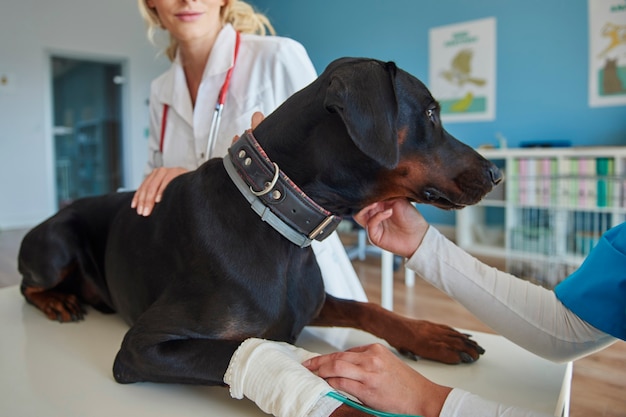Healing Paws: Canine Rehabilitation For Treating IVDD In Dogs


IVDD in Dogs: Treating with Canine Rehabilitation
Intervertebral Disc Disease (IVDD) is a common spinal condition that affects dogs, causing pain, paralysis, and a disruption of their normal activities. When faced with IVDD, pet owners often seek effective and compassionate treatment options to help their furry companions regain mobility and comfort. Canine rehabilitation emerges as a powerful ally in the journey toward healing. In this blog post, we will explore the world of IVDD, its impact on dogs, and how canine rehabilitation can provide tailored solutions to promote recovery, strengthen muscles, and enhance the overall well-being of our four-legged friends.
IVDD occurs when the discs between the vertebrae of the spine degenerate or rupture, causing pressure on the spinal cord. This pressure leads to pain, muscle weakness, and in severe cases, paralysis. Certain breeds, like Dachshunds, are genetically predisposed to IVDD, while other factors like obesity and age can contribute to its development. The condition varies in severity, ranging from mild discomfort to complete loss of mobility.
Canine rehabilitation offers a comprehensive approach to treating IVDD, tailored to the specific needs and condition of each dog. Here are some key techniques employed in IVDD rehabilitation:
- Pain Management: Rehabilitation experts use techniques such as massage, acupuncture, and laser therapy to alleviate pain and reduce inflammation. This helps improve the dog’s comfort while promoting healing.
- Physical Therapy: Customized exercises are designed to strengthen muscles, improve balance, and support the spine. These exercises help the dog regain strength and mobility, preventing muscle atrophy and promoting overall well-being.
- Hydrotherapy: Swimming and underwater treadmill exercises provide a low-impact environment for muscle strengthening without putting strain on the spine. The buoyancy of water reduces pressure on the affected area.
- Balance and Coordination Exercises: These exercises help improve the dog’s proprioception (awareness of limb position), balance, and coordination, aiding in regaining normal movement patterns.
- Weight Management: Maintaining a healthy weight is crucial for dogs with IVDD, as excess weight places additional stress on the spine. Rehabilitation specialists provide guidance on proper nutrition and exercise routines.
- Gait Training: Rehabilitation professionals help dogs learn how to walk properly again, ensuring that their gait is balanced and efficient.
- Assistive Devices: In some cases, rehabilitation specialists may recommend assistive devices such as harnesses or carts to support the dog’s mobility while they recover.
Benefits of Canine Rehabilitation for IVDD
- Customized Treatment Plans: Rehabilitation specialists create individualized treatment plans tailored to the severity of IVDD and the specific needs of the dog, ensuring effective and safe care.
- Pain Relief: Rehabilitation techniques help alleviate pain and discomfort, allowing dogs to heal more comfortably.
- Muscle Strengthening: Through exercises and hydrotherapy, rehabilitation helps dogs regain muscle strength, preventing muscle atrophy and promoting proper spinal support.
- Improved Mobility: Canine rehabilitation aids in restoring normal movement patterns, helping dogs regain their ability to walk and engage in daily activities.
- Long-Term Support: Rehabilitation provides ongoing support for dogs with IVDD, helping them maintain their progress and comfort as they age.
IVDD may present challenges, but with the guidance of a certified rehabilitation specialist and the power of tailored techniques, dogs can overcome its effects and experience a better quality of life. Canine rehabilitation offers a comprehensive approach that addresses pain, muscle strengthening, balance, and overall mobility. Whether through pain management, hydrotherapy, physical therapy, or gait training, rehabilitation paves the way for our four-legged friends to regain their vitality and mobility. If your dog is grappling with IVDD, consult a veterinary professional and rehabilitation specialist to explore the possibilities of this transformative approach, helping your beloved companion embark on a journey of healing and recovery. To learn more about how we can help treat IVDD.




